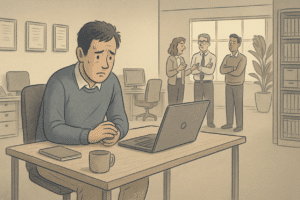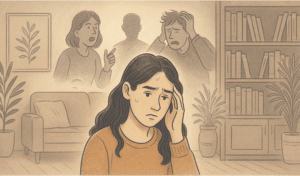Key Takeaways
- Depression is a complex mental health disorder caused by biological, psychological, and environmental factors.
- Negative thinking patterns and social isolation can significantly contribute to the progression of depression.
- Adequate sleep, proper nutrition, and varied physical activity play crucial roles in managing and potentially alleviating depressive symptoms.
- A Mission for Michael (AMFM) offers compassionate, personalized mental health treatment plans across California, Washington, and Virginia.
Understanding Depression
Depression is a profound and intricate mental health disorder that extends far beyond occasional feelings of sadness. It’s a complex interplay of biological, psychological, and environmental factors.
Unlike temporary emotional downturns, clinical depression is a serious condition that impacts every aspect of a person’s existence, from neurological functioning to social interactions and personal relationships.
| A Mission For Michael: Expert Mental Health Care Founded in 2010, A Mission For Michael (AMFM) offers specialized mental health care across Southern California, Washington, and Virginia. Our accredited facilities provide residential and outpatient programs, utilizing evidence-based therapies such as CBT, DBT, and EMDR. Our dedicated team of licensed professionals ensures every client receives the best care possible, supported by accreditations from The Joint Commission and the California Department of Health Care Services. We are committed to safety and personalized treatment plans. Start your recovery journey with AMFM today! |
Everyday Factors That Can Worsen Depression
Why Sleep Matters for Mental Health
Sleep is far more than just a time to rest. It’s a critical process where the body and brain heal, process information, and reset. The connection between sleep and depression is deeply intertwined.
Poor sleep can contribute to developing depressive symptoms, while depression can simultaneously disrupt normal sleep patterns. When sleep is insufficient, the brain struggles to process emotional experiences, consolidate memories, and manage stress. This disruption can affect hormone levels, increase inflammation, weaken immune function, and make a person more emotionally vulnerable.
How Food Impacts Mental Well-Being
The connection between diet and emotional well-being is becoming increasingly clear. What people eat doesn’t just provide energy – it supplies the essential building blocks that support brain function and emotional regulation.
Certain nutrients directly influence brain chemistry and mood. Omega-3 fatty acids, for example, support brain health and can help reduce inflammation. Probiotics have been shown to support the gut microbiome, which has a surprising connection to mood and emotional balance.
A balanced diet can provide the body with the tools it needs to maintain better mental health.
Moving Your Body to Improve Mental Health
Exercise does much more than just improve physical fitness – it has profound effects on mental and emotional well-being.
Regular physical activity stimulates the production of endorphins, the body’s natural mood boosters. It can help reduce stress, improve sleep quality, boost self-esteem, and provide a sense of accomplishment. Even modest amounts of exercise (30 minutes/day) can interrupt negative thought patterns and create positive changes in both body and mind.
Thoughts, Feelings, and Mental Health

Daily habits and surroundings can either support recovery or worsen depression.
Breaking Free from Negative Thinking Patterns
Negative thinking patterns can create self-reinforcing cycles of emotional distress. Common thought distortions include:
- Catastrophizing: Assuming the worst
- Overgeneralization: Seeing a single event as a never-ending pattern
- Black-and-white thinking: Viewing situations in extreme, all-or-nothing terms
These thought patterns are more than just temporary negative ideas – they’re deeply ingrained mental habits that develop over time. Therapeutic approaches like Cognitive Behavioral Therapy (CBT) and mindfulness techniques aim to interrupt these patterns, helping individuals develop more balanced, realistic ways of thinking.
The Importance of Human Connections
Humans are inherently social beings, and social connections are critical to mental health. Social isolation worsens depression by disrupting stress regulation due to a lack of meaningful interactions.
Lack of social support limits emotional processing opportunities and increases feelings of loneliness. These disconnections can create a cycle of increasing emotional vulnerability.
Health Changes and Depression
Hormonal Influences on Mood
Periods such as pregnancy, postpartum recovery, and menopause can greatly influence mood and emotional stability. These hormonal shifts can trigger or intensify depressive symptoms, creating unique challenges that require specialized, nuanced treatment approaches.
Chronic Illness and Mental Health
Chronic medical conditions can both result from and contribute to depressive states. The stress of managing a chronic illness, coupled with potential physiological changes and treatment side effects, can significantly impact mental well-being. Comprehensive care must address both physical and psychological aspects of health.
Choose A Mission for Michael to Your Depression Treatment

A supportive treatment setting can create the right environment for healing.
At A Mission for Michael (AMFM), we understand that depression is not a one-size-fits-all condition. Our approach is deeply rooted in compassion, scientific understanding, and personalized care. We recognize that each individual’s journey with depression is unique, shaped by their personal experiences, biological makeup, and environmental factors.
Our Comprehensive Approach to Mental Health

Professional support and structured therapy can help break the cycle of depression.
We blend evidence-based therapies like CBT and Dialectical Behavioral Therapy (DBT) with holistic healing techniques like equine and art therapy to create a supportive environment that addresses the entire spectrum of mental health. Our centers, located across California, Virginia, and Washington, provide a sanctuary for individuals struggling with depression, providing hope and practical support.
Frequently Asked Questions (FAQ)
How does sleep impact depression?
Poor sleep can contribute to the development of depressive symptoms by disrupting emotional regulation, memory consolidation, and stress management.
Can diet really affect mental health?
Yes, nutrition plays a crucial role in mental health. Certain nutrients like the intake of Omega-3 fatty acids directly influence brain chemistry, mood, and overall emotional well-being.
How do social connections influence depression?
Social isolation can trigger and intensify depression by disrupting natural stress-regulation processes and increasing feelings of loneliness.
What makes A Mission for Michael different from other mental health treatment centers?
A Mission for Michael (AMFM) offers a comprehensive, compassionate approach to depression treatment by blending evidence-based treatments with holistic healing techniques across multiple locations in California, Washington, and Virginia.







